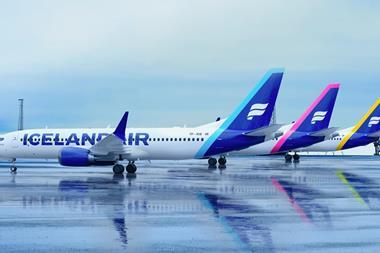Icelandair Group is expecting its cargo operation to return an operating profit over the course of this year, after recent poor results.
The company says it has a “clear plan” to turn around the cargo division, which generated full-year revenues of $88.3m – a fall from the previous year’s $90.8m.
“Profitability in the cargo operation decreased significantly,” said group finance chief Ivar Kristinsson during a full-year briefing.
He says the cargo performance improved between the third and fourth quarter. But cargo revenues were still down in the fourth quarter compared with the previous year, reaching $21.6m.
Icelandair Group says it is implementing “diverse improvement measures” to address the situation.
It is returning a Boeing 757 freighter to its lessor in spring, and is dry-leasing a 767 freighter out of the fleet for the full duration of this year.
Chief executive Bogi Nils Bogason says the 767 has been leased to “align capacity to the demand”.
Icelandair Group says other changes are being put in place including an “optimised flight schedule” and “adjusted network”.
There is an “increased focus” on core products, it adds, driving higher unit revenues.
Cargo markets were “challenging” last year, but the company believes its measures are starting to produce positive effects, and it forecasts an operating profit for this year compared with the “considerable” operating loss in 2023.
In an interview with Air Cargo News towards the end of last year, Einar Már Guðmundsson, Icelandair Cargo’s interim manager director for airfreight and logistics, said that put
on hold its planned US network expansion because of a weaker global market.
At the time, the carrier was operating two 767Fs and a single 757F. With one of the 767s now leased out, the carrier has a single 767 and a single 757, which is due to be returned to its lessor WNG Capital in the coming months.
It previously operated a fleet of two 757Fs.
The global downturn saw Icelandair Cargo suspend operations to Chicago from Belgian hub Liege in September after their start-up in January 2023.
It also cancelled the launch of services to Los Angeles. Both services are likely to lift off when the global air cargo market stabilises. However, operations to New York continue.
The switch to a 767 freighter fleet was all part of a plan to expand the freighter network beyond its Iceland to Europe operations, dictated by the flight distance limitations of the 757
aircraft.
The potential network growth of the 767 freighters was stalled by the economic shocks of the Covid-19 pandemic, quickly followed by the Ukraine-Russia war and a global downturn.
However, Icelandair Cargo’s strategic infrastructure investment at its Keflavik hub – a 40-minute drive from the capital, Reykjavík – had gone ahead and has 1,400 sq m of temperature-controlled facilities for handling perishable goods and pharmaceuticals.
The airline hopes that its cold chain investment at Keflavik will see it serve a greater share of the global pharma and life-sciences markets, helped by the fact that Iceland has a large home-grown
pharma company on its doorstep.
Currently, some 90% of export volumes handled by Icelandair Cargo are fresh fish, which is no surprise, but one aspect of the remaining 10% of general cargo is the Icelandic horse, a breed
popular in Germany, for example, because they have a unique gait, are quite small, good natured and child-friendly.
A three-year deal signed in 2020 between FedEx/TNT and Icelandair Cargo remains in place for parcel traffic between Iceland and mainland Europe.
https://www.aircargonews.net/people/icelandair-cargos-md-quits/
https://www.aircargonews.net/services/freighter-conversions-mro/icelandair-cargo-takes-delivery-of-second-boeing-767-converted-freighter/















